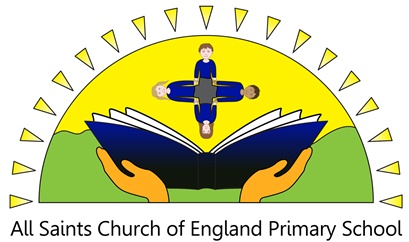Writing
Research from the EEF suggests that
- The evidence suggests that children benefit from a balanced approach to literacy that includes a range of approaches.
- Effective writers use a number of strategies to support each component of the writing process.
- A focus on oral language skills will have benefits for both reading and writing.
Intent
At All Saints we intend to provide all pupils with quality teaching that will allow them to speak, read and write fluently so that they are able to communicate ideas and emotions to others.
Writing is a crucial part of our curriculum and is used across all areas as a priority. All children are provided with many opportunities to develop their writing skills in all subject areas.
We encourage our pupils to plan, draft, edit and publish their work whilst showing awareness for purpose and increase their knowledge of vocabulary and grammar.
We also intend for pupils to leave our school with fluent and legible handwriting.
We promote not only reading for pleasure but also writing for pleasure and give them many opportunities to practise and show their work.
When looking at spelling across the school, teachers show pupils the relationship etymology words, allowing them to develop their understanding. They show pupils how to work out and clarify meaning of unknown words and think about words with more than one meaning.
Teachers also teach pupils to control their speaking and writing, using Standard English.
Implementation:
- All English lessons develop children’s spoken language, writing, grammar and vocabulary.
- Writing opportunities are taught across the curriculum.
- Our pupils are encouraged to write for pleasure and this is celebrated as a whole school.
- We use Read Write Inc for our Phonics programme and all staff in Key Stage 1 and support staff across the whole school have had training in this.
- We develop writing skills so that our pupils have the stamina and ability to write at the age expected standard.
- To support children in moving towards independent writing we provide a wide range of activities including use of film and imagery, modelled, shared and guided writing, peer editing and discussion.
- We use Pie Corbett’s talk4writing.
- We provide opportunities for writing for purpose and we encourage pupils to see themselves as authors.
- Handwriting is incorporated in every lesson across the curriculum.
- Spelling is incorporated in lessons across the curriculum but also has time in the timetable daily.
- Grammar is taught across the school with Key Stage 2 having a discreet grammar lesson taught every week.
- A range of extra activities are used to promote literacy within the school including Themed days such as World Book Day and author visits.
Impact:
- We have a high-quality writing curriculum that is demonstrated across different subjects in school.
- Children can understand and apply the fundamental principles of spelling, grammar and punctuation in their writing.
- Children are responsible, competent, confident and creative writer’s
- A celebration of learning for each week demonstrates a progression of learning across the school.
- Children communicate clearly using accurate grammar, punctuation, handwriting and spelling.
- Children experience the achievement of becoming celebrated published authors.
- Children will develop competence in transcription (spelling and handwriting) and composition (articulating ideas and structuring them in speech and writing) at national expectation and at greater depth.
